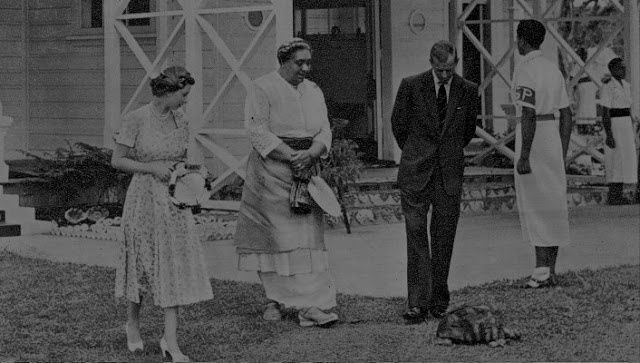
by Victoria Silverwolf
with apologies to Roy Orbison
Solitary Confinement
To be a citizen of a nation inside another nation must be a very lonely feeling. Italy contains two of these countries, the tiny nations of San Marino and Vatican City. A third member of that exclusive club came into existence on October 4, when the former British colony of Basutoland won full independence, changing its name to the Kingdom of Lesotho. Lesotho is completely surrounded by the nation of South Africa.

King Moshoehoe II, constitutional monarch of Lesotho.
A Song for the Sorrowful
You don't have to be living in any of those three countries to feel lonely, of course. People experiencing that painful emotion might obtain some solace from the current Number One song on the American popular music charts. The Four Tops have a smash hit with their powerful ballad Reach Out (I'll Be There), with lyrics that are clearly aimed at a lonesome listener.

They seem to be reaching out to the record buyer.
Fiction for the Forlorn
Appropriately, the latest issue of Fantastic is full of stories featuring characters who are literally, or metaphorically, isolated.

Cover art by Bob Hilbreth, stolen from the December 1946 issue of Amazing Stories.

The original, illustrating a story that was part of the infamous Shaver Mystery.
Broken Image, by Thomas N. Scortia

Illustrations by Gray Morrow.
The only new story in this issue features a protagonist who feels himself estranged from those around him, human or not.
His name is Baldur, and he has been surgically altered to resemble one of the humanoid aliens inhabiting a planet for which Earthlings have plans. It seems that humanity has evolved beyond sectarianism and violence, and seeks to bring the blessings of peace to other worlds.
(If I sound a little sarcastic, that's because the story's view of humanity is somewhat ambiguous. Baldur is completely loyal to the idea of Man as a perfect being, but his vision of the species is, as we'll see, a little distorted.)
One group of aliens oppresses another, going so far as to execute rebels in a particularly gruesome way.

Such as this.
The plan is to have Baldur act as a messiah for the lower class. Highly advanced technology allows him to perform healings and other miracles.
(At this point, you've probably figured out that Baldur is intended as a Christ figure. The oppressors are kind of like the Romans, the lower class is sort of like the Judeans, and so on. Given that analogy, some of what happens won't surprise you. The character's name also suggests an allusion to myths about the Norse god Baldr, sometimes spelled Balder or — a ha! — Baldur.)
There's a human woman, also in disguise, to help Baldur in his role as the savior of the oppressed. However, it turns out that she's hiding something from him, and that the folks in the starship orbiting the planet have schemes of which he is not aware.
This is a pretty good story, which held my interest all the way through. The Christian metaphor might be too blatant, and there's a twist ending that made me scratch my head. It explains why Baldur thinks of humanity as superior to other species, but I'm not sure if it really works.
(One interesting thing is that Baldur is not only physically changed, but mentally as well. His memories seem to be slightly distorted. Since we see everything from his point of view, although the story is told in third person, he serves as what some literary critics are starting to call an unreliable narrator. This all goes along with the twist ending.)
Three stars.
You're All Alone, by Fritz Leiber

Illustrations by Henry Sharp.
There's a title that suggests loneliness, for sure.
Before I get into the story itself, let me go over the rather complex history of the text. It seems that Leiber intended it to appear in Unknown, the fantasy magazine edited by John W. Campbell, Jr. as a companion to Astounding. Unknown died before the story could be published.
Leiber expanded the work from about forty thousand words to approximately seventy-five thousand, hoping to have a book publisher accept it as part of their fantasy line. The company stopped publishing fantasy before it sold.
Back to the drawing board! Leiber next sent it to Fantastic Adventures, who agreed to buy it if — guess what? — it was cut back to forty thousand words. It finally appeared in the July 1950 issue. That's the version that's been reprinted in the current issue of Fantastic.

Cover art by Robert Gibson Jones.
We're not done yet! The seventy-five thousand word version wound up as one half of a double paperback, under the name The Sinful Ones. The publisher came up with the suggestive new title, altered the text slightly to make it racier, and added sexy chapter titles like The Strip Tease and Blonde Prostitute, trying to convince the reader that it was hot stuff.

Anonymous cover art. The companion novel, about a lady bullfighter, looks . . . interesting.
Back to the story itself. (At forty thousand words, it actually justifies, if just barely, its label by the magazine as a Complete Novel.)
Carr Mackay works at an employment agency in Chicago. A frightened young woman comes into his office, followed by a big blonde woman. The younger woman is obviously terrified of the blonde, but tries to ignore her. She talks to Carr, pretending to have a job interview, and asking him if he's one of them.

By the way, the blonde woman has a big, vicious, scary pet dog, but it's not anywhere near as large as shown in this illustration, or the cover of Fantastic Adventures!
Before leaving, she scribbles a note warning him to watch out for the blonde and her two male companions, and leaving a cryptic message to meet her at a certain location if he wants to learn more.
Of course, this all sounds like the paranoid ravings of a lunatic. Things get weirder when the blonde slaps the young woman across the face, and she forces herself not to react. Then a co-worker shows up, acting as if he's introducing Carr to somebody, but there's nobody there. Some kind of practical joke?
It's hard to deny that something strange is going on when Carr shows up at his girlfriend's place, and she goes through the motions of greeting and kissing him, but he's not where she apparently thinks he is. She ignores the real Carr, and continues to interact with an imaginary one.

She should really be smooching the empty air instead of a ghostly figure, but that's artistic license for you.
Although he's reluctant to accept the truth, Carr realizes that almost all humans are mindless automatons, just going through the motions like wind-up toys. Only a very few, like the young woman, the blonde and her companions, and himself, are conscious beings. He meets with the woman, leading to dangerous encounters with sinister folks and wild adventures in a world full of clockwork people and those who take advantage of the situation.

A moment of happiness in a public library after hours. I like the subtle hint that the light above their heads is an eye watching them.
The premise is a fascinating one, and the author conveys it in a convincing manner. There's some philosophical depth to the idea, too. Who among us hasn't felt like a cog in a big machine? It moves very quickly, almost like a Keith Laumer novel. (Maybe the longer version allows for more exploration of the concept.)
I could quibble that not everything about the plot is completely logical. Inanimate objects sometimes act as if they're part of the mindless mechanism of life, and sometimes don't. The conscious people are able to knock off the hats of the automatons, for example, and steal their drinks, but the keys of a piano move by themselves when the person supposed to be playing them isn't there.

The floating hands are more artistic license.
Despite this tiny flaw, and the fact that the ending seems rushed, it's an enjoyable short novel. As you'd expect from Leiber, it's well-written. As a bonus, it provides a vivid portrait of the city of Chicago, in all its bright and dark aspects.
Four stars.
Breakfast at Twilight, by Philip K. Dick

Cover art by Clarence Doore.
From the July 1954 issue of Amazing Stories comes this tale of a family isolated from their own time.

Anonymous illustration.
Mom, Dad, and three kids are enjoying a typical morning at home, although there's some kind of fog or smoke outside, and the radio isn't working. The lone boy heads off for school, but quickly comes back. There are soldiers everywhere blocking his way.
It turns out that their home is now seven years in the future. The Cold War has heated up, leading to a dystopian society. (Apparently a bomb caused the time travel effect.) The soldiers are stunned to see a woman and children out in the open, and are even more amazed at the food available in the house.
A political officer (another sign that the United States government has become authoritarian, along with the casually mentioned book burning) suggests that they wait for another bomb to send them back to their own time.
Although the plot is simple enough for an episode of Twilight Zone, this is a powerful story, sending a clear warning of the dangers of escalating world conflicts. (The theme seems even more relevant today, with the situation in Vietnam, than it did just after the Korean War.)
Four stars.
Scream at Sea, by Algis Budrys

Cover art by Vernon Kramer.
The January-February 1954 issue of the magazine provides this example of extreme loneliness.

Illustrations by Ernie Barth.
A man survives an explosion that destroys his ship. He manages to hang on to a piece of the vessel that's got some canned ham and water, so it serves him as a sort of raft. The ship's cat happens to escape the disaster as well.

The only other character in the story.
The author manages to create a true sense of isolation and desperation. It's not a bad piece, but there isn't a trace of science fiction or fantasy at all! There's a twist in the tail that would have been more appropriate for Alfred Hitchcock's Mystery Magazine than Fantastic.
(By the way, the editor's blurbs for the last two stories are backwards! I guess that's a sign of how little the publisher cares for these poorly funded magazines full of unpaid reprints.)
Three stars.
Edgar Rice Burroughs: The Artists Behind Him, by Anonymous
Serving as a coda is this portfolio of illustrations for stories by ERB that appeared in Amazing years ago.

For The Land That Time Forgot (1918, reprinted 1927), illustration by Frank R. Paul.

Same credits as above.
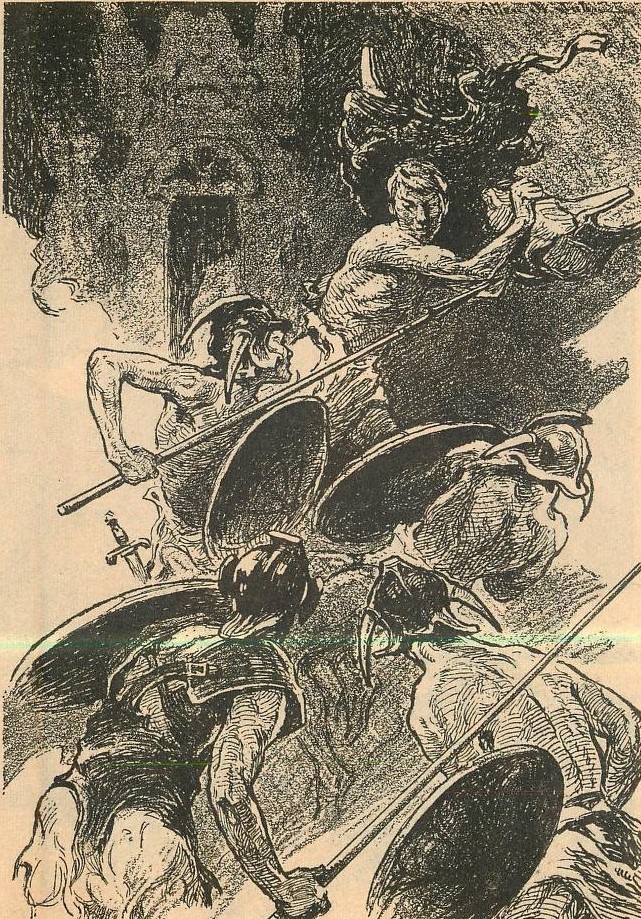
For The City of the Mummies (1941), illustration by J. Allen St. John.

For Black Pirates of Barsoom, same year, same artist.

For Goddess of Fire, same year, same artist.
I don't have much to say about these old-fashioned pictures. They're OK.
Three stars.
Some Solace For Solitude
If you're feeling lonesome, picking up a copy of this issue might provide some relief for a few hours. All the stories are worth reading, and a couple of them are better than average. If that doesn't raise your spirits sufficiently, visiting your neighbors might do the trick.
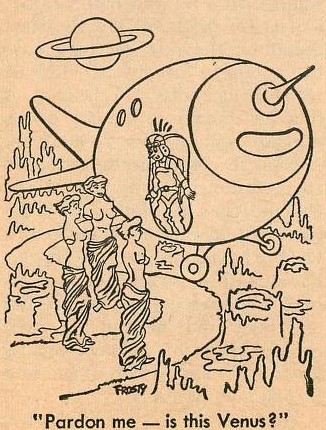
That astronaut won't be lonely. Cartoon by Frosty from the same issue as the Budrys story.


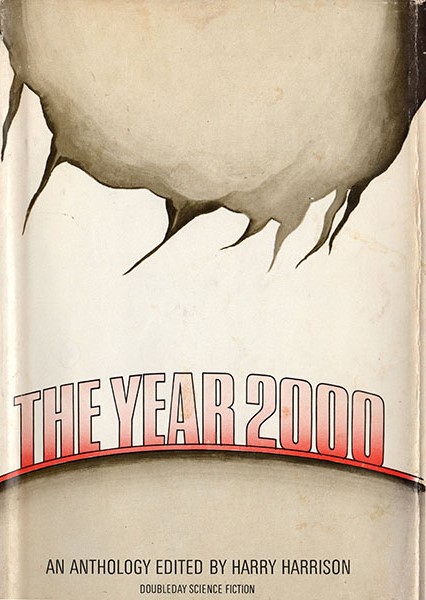

![[February 10, 1970] Thirty Years To Go (<i>The Year 2000</i>, a science fiction anthology by Harry Harrison)](https://galacticjourney.org/wp-content/uploads/2025/02/THEYEARF51970.jpg)
![[November 30, 1969] Capstone to a decade (December 1969 <i>Analog</i>)](https://galacticjourney.org/wp-content/uploads/2024/11/691130analogcover-672x372.jpg)


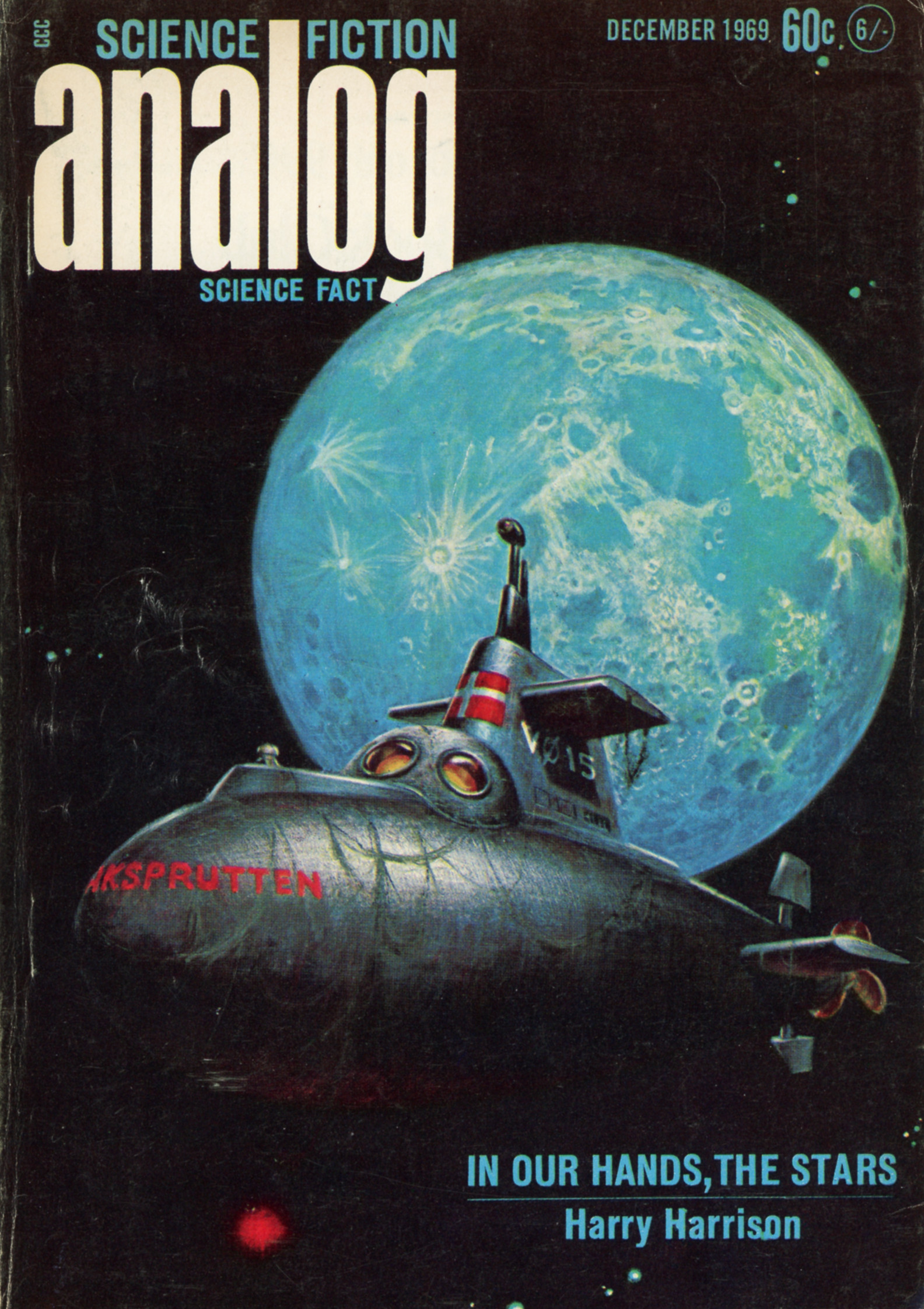
![[November 8, 1969] Arabesques (December 1969 <i>Fantastic</i>)](https://galacticjourney.org/wp-content/uploads/2024/10/COVERARTSMALL.jpg)











![[October 16, 1966] Only the Lonely (November 1966 <i>Fantastic</i>)](https://galacticjourney.org/wp-content/uploads/2021/10/fantastic_196611-3.jpg)
























![[June 30, 1965] Every Day has its Dog (July 1965 <i>Analog</i>)](https://galacticjourney.org/wp-content/uploads/2020/06/650630cover-672x372.jpg)






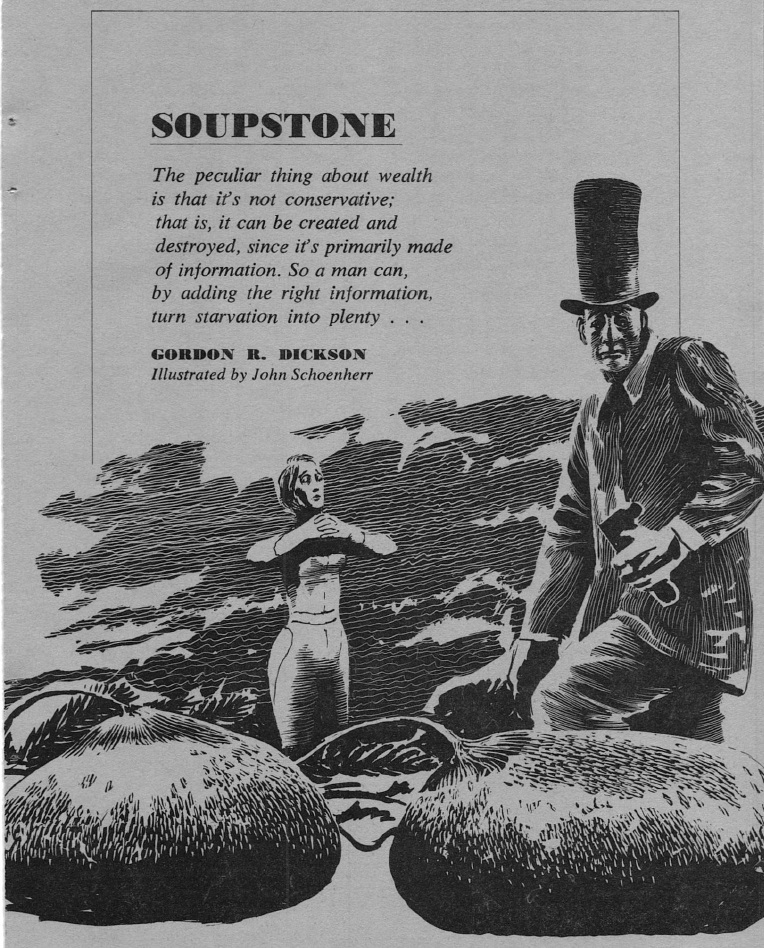




![[May 22, 1965] Goodbye and Hello (June 1965 <i>Fantastic</i>)](https://galacticjourney.org/wp-content/uploads/2020/05/Fantastic_v14n06_1965-06_0000-2-672x265.jpg)
